the Wall, We Are Right
There With You
If you’ve been arrested or charged with a crime in California, navigating the criminal process can feel overwhelming. The criminal justice system is complex, and understanding each step is crucial to protecting your rights and ensuring a fair trial. Whether you’re facing misdemeanor or felony charges in Los Angeles or Orange County, the team at Power Trial Lawyers is here to provide you with expert legal guidance.
This article will walk you through the key phases of the criminal process in California, from arrest to trial and everything in between, providing the information you need to stay informed and empowered. Our firm is committed to fighting for your rights and ensuring the best possible outcome.

The California criminal process is structured to uphold justice, but without proper legal representation, it can be difficult to navigate. From your initial arrest to sentencing, each phase plays a crucial role in the final outcome of your case.
The criminal process begins when law enforcement arrests you based on probable cause or a warrant. Once arrested, you’ll be taken to the police station for booking, where officers will record your personal information, the crime you’re accused of, and collect fingerprints and photographs. After booking, you may be held in jail until your arraignment, or released on bail depending on the circumstances of the case.
The arraignment is your first court appearance, typically within 48 hours of your arrest. At this stage, you will hear the charges against you, and the judge will ask for your plea—guilty, not guilty, or no contest. You’ll also be informed of your right to an attorney. If you cannot afford one, the court will appoint a public defender. The judge will also decide whether to adjust your bail amount or continue holding you in custody.
The pretrial phase consists of hearings and motions that take place before your trial begins. During this stage, your defense attorney will file motions to challenge the prosecution’s evidence, such as a motion to suppress evidence if the evidence was obtained unlawfully. This phase is critical, as it can determine whether your case will proceed to trial or be resolved through a plea deal.
In many cases, the prosecution may offer a plea deal as an alternative to trial. A plea bargain typically involves pleading guilty to lesser charges in exchange for reduced penalties. While plea bargaining can resolve your case more quickly, it’s important to weigh the benefits against the long-term consequences. A skilled criminal defense attorney can help you determine whether accepting a plea is in your best interest.
More importantly, there can also be pre-trial diversion, where you lawyer seeks to get your case dismissed. This is a diversion process used by the courts that allow defendants to submit to an agreed-upon program or activity (i.e., community service hours), and upon completion, the court can dismiss the matter all together. Consult with an attorney about whether your case may qualify for a plea deal or pre-trial diversion.
If your case proceeds to trial, both the prosecution and defense will present their evidence to a judge or jury. During the trial, your attorney will cross-examine witnesses, challenge the prosecution’s evidence, and present arguments on your behalf. The trial will conclude with either a conviction or acquittal.
If you are convicted or plead guilty, the next step is sentencing. During sentencing, the judge will determine your punishment based on the severity of the crime and any aggravating or mitigating factors. Sentencing can include fines, probation, community service, or jail time. For more serious offenses, you could face years in prison.
If convicted, you may have the right to file an appeal. Appeals are requests for a higher court to review your case for legal errors that may have affected the outcome. The appellate process is complex, but with the right representation, a successful appeal can lead to a reversal of your conviction or a reduced sentence.
California criminal offenses are divided into two main categories: misdemeanors and felonies.
Understanding the severity of the charges you face is critical in preparing an effective defense. The stakes are much higher in felony cases, and working with an experienced criminal defense attorney is essential.
Every criminal case is unique, and the defense strategy employed will depend on the specific facts of your case. Some common defenses include:
The criminal process in California is not something you want to face without an experienced attorney by your side. At Power Trial Lawyers, we have successfully represented clients in both Los Angeles and Orange County, providing personalized, aggressive defense tailored to each case. From arraignment to appeals, we are here to protect your rights and fight for the best possible outcome.
If you are facing criminal charges, don’t leave your future to chance. The attorneys at Power Trial Lawyers are ready to defend your rights and provide you with the legal representation you need. Call us at (888) 808-2179 for a free consultation, or submit a contact form today. Let us fight for your freedom.
Don’t let criminal charges control your future. Contact Power Trial Lawyers at (888) 808-2179 or submit a contact form for a free consultation and get the expert defense you need.